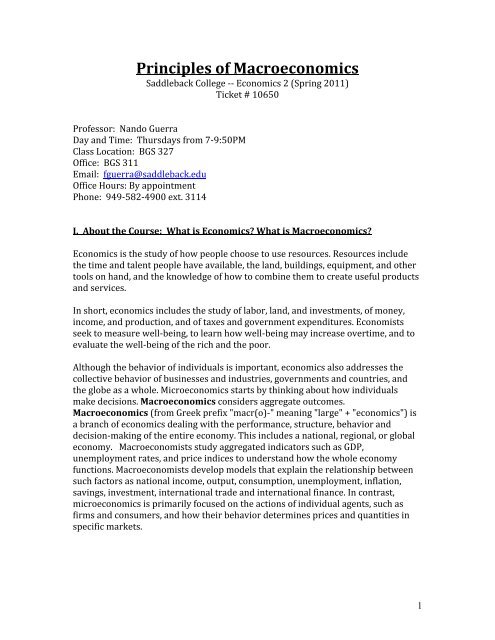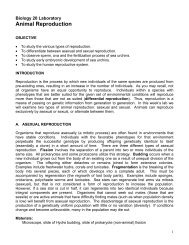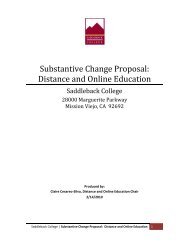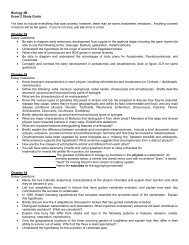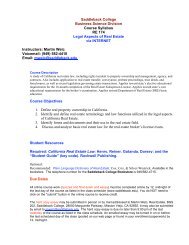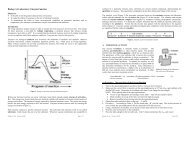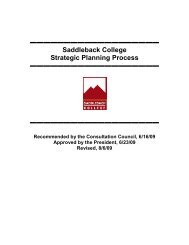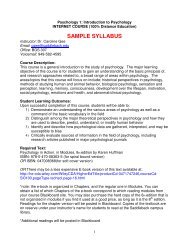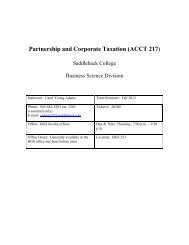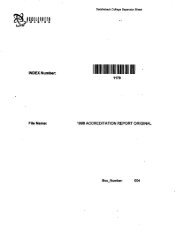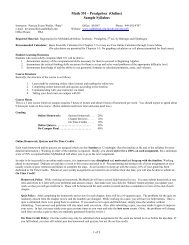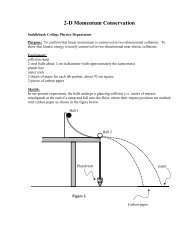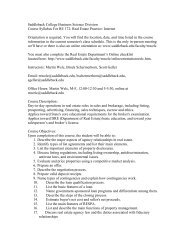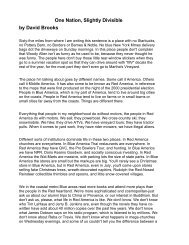Econ 2 - Principles of Macroeconomics - Saddleback College
Econ 2 - Principles of Macroeconomics - Saddleback College
Econ 2 - Principles of Macroeconomics - Saddleback College
You also want an ePaper? Increase the reach of your titles
YUMPU automatically turns print PDFs into web optimized ePapers that Google loves.
<strong>Principles</strong> <strong>of</strong> <strong>Macroeconomics</strong><br />
<strong>Saddleback</strong> <strong>College</strong> ‐‐ <strong>Econ</strong>omics 2 (Spring 2011)<br />
Ticket # 10650<br />
Pr<strong>of</strong>essor: Nando Guerra<br />
Day and Time: Thursdays from 7‐9:50PM<br />
Class Location: BGS 327<br />
Office: BGS 311<br />
Email: fguerra@saddleback.edu<br />
Office Hours: By appointment<br />
Phone: 949‐582‐4900 ext. 3114<br />
I. About the Course: What is <strong>Econ</strong>omics? What is <strong>Macroeconomics</strong>?<br />
<strong>Econ</strong>omics is the study <strong>of</strong> how people choose to use resources. Resources include<br />
the time and talent people have available, the land, buildings, equipment, and other<br />
tools on hand, and the knowledge <strong>of</strong> how to combine them to create useful products<br />
and services.<br />
In short, economics includes the study <strong>of</strong> labor, land, and investments, <strong>of</strong> money,<br />
income, and production, and <strong>of</strong> taxes and government expenditures. <strong>Econ</strong>omists<br />
seek to measure well‐being, to learn how well‐being may increase overtime, and to<br />
evaluate the well‐being <strong>of</strong> the rich and the poor.<br />
Although the behavior <strong>of</strong> individuals is important, economics also addresses the<br />
collective behavior <strong>of</strong> businesses and industries, governments and countries, and<br />
the globe as a whole. Microeconomics starts by thinking about how individuals<br />
make decisions. <strong>Macroeconomics</strong> considers aggregate outcomes.<br />
<strong>Macroeconomics</strong> (from Greek prefix "macr(o)‐" meaning "large" + "economics") is<br />
a branch <strong>of</strong> economics dealing with the performance, structure, behavior and<br />
decision‐making <strong>of</strong> the entire economy. This includes a national, regional, or global<br />
economy. Macroeconomists study aggregated indicators such as GDP,<br />
unemployment rates, and price indices to understand how the whole economy<br />
functions. Macroeconomists develop models that explain the relationship between<br />
such factors as national income, output, consumption, unemployment, inflation,<br />
savings, investment, international trade and international finance. In contrast,<br />
microeconomics is primarily focused on the actions <strong>of</strong> individual agents, such as<br />
firms and consumers, and how their behavior determines prices and quantities in<br />
specific markets.<br />
1
II. Required Textbook:<br />
<br />
Timothy Taylor, <strong>Principles</strong> <strong>of</strong> <strong>Macroeconomics</strong>, 2nd Edition, Textbook<br />
Media, 2011 (ISBN 1‐930789‐25‐5)<br />
III. Recommended Books and other Readings:<br />
<br />
<br />
<br />
<br />
<br />
<br />
<strong>Econ</strong>omics Explained, Robert Heilbroner and Lester Thurow<br />
How Markets Fail, John Cassidy<br />
The 21 st Century <strong>Econ</strong>omy, A Beginner’s Guide, Randy‐Charles Epping<br />
The Little Book <strong>of</strong> <strong>Econ</strong>omics, Greg Ip<br />
The <strong>Econ</strong>omist, Bloomberg BusinessWeek & Foreign Policy magazines<br />
The Financial Times and The New York Times, online versions, Business,<br />
World, Opinion and Comment Sections<br />
IV. Additional Recommended Course Resources:<br />
<br />
<br />
<br />
Roubini Global <strong>Econ</strong>omics website<br />
Confessions <strong>of</strong> an <strong>Econ</strong>omic Hitman, John Perkins<br />
Daniel Yergen and Joseph Stanislaw, The Commanding Heights: The Battle<br />
for the World <strong>Econ</strong>omy, 2002 edition, website and PBS film<br />
John R. Talbott, Obamanomics, Seven Stories, 2008<br />
GPS: Global Public Square, with Fareed Zakaria, program on CNN<br />
V. Experts in the Field <strong>of</strong> <strong>Econ</strong>omics (More Resources)<br />
Look for articles, essays, editorials, books, and interviews from these experts in<br />
<strong>Econ</strong>omics and International <strong>Econ</strong>omics:<br />
<br />
Nouriel Roubini, Mark Zandi, Joseph Stiglitz, Paul Krugman, Raghuram Rajan,<br />
Nassim Nicholas Taleb, J. Bradford DeLong, Kenneth Rog<strong>of</strong>f, Dani Rodrik,<br />
Jeffrey Sachs and Robert Skidelsky<br />
VI. Student Responsibilities:<br />
Attendance – Students are responsible for attending all class meetings. You cannot<br />
benefit from class if you are not here. If you miss class you will have to work harder<br />
to learn and remember the material, your understanding will be incomplete, and<br />
you will likely perform more poorly on the quizzes and exams. If you miss more<br />
than one class you must provide a valid excuse which includes documented medical<br />
problems and other emergencies. You may inform me in person or via email.<br />
Excessive absences from class will automatically result in a lower final grade<br />
regardless <strong>of</strong> your performance on graded assignments. Do not come to class late<br />
and all cell phones must be turned <strong>of</strong>f. It is your exclusive responsibility to submit a<br />
2
drop card to admissions and records. Failure to do so will result in an “F” grade for<br />
the course.<br />
Academic Honesty – Students are expected to comply with the Academic Honor<br />
Code as stated in the 2010‐2011 <strong>Saddleback</strong> <strong>College</strong> Catalog as well as the Student<br />
Code <strong>of</strong> Conduct. Please see me if you would like a copy <strong>of</strong> these policies. The<br />
instructor reserves the right to determine academic repercussions for failing to<br />
comply with either <strong>of</strong> these policies.<br />
VII. Student Resources:<br />
Please visit the following link for information regarding student resources:<br />
http://www.saddleback.edu/sbs/Student_Resources.html<br />
VIII. Course Structure, Requirements and Grades:<br />
Class meets roughly three hours once a week. The format will include a discussion <strong>of</strong><br />
weekly current events, lectures, discussion <strong>of</strong> course readings, and films. It is<br />
absolutely critical that students arrive at each class meeting having completed the<br />
assigned reading. The course will have a midterm and final exam. The exams will be<br />
based on lectures and readings. In addition, this course will include quizzes. Grading<br />
will be determined as follows:<br />
Quizzes<br />
Attendance: 5%<br />
Quizzes: 30%<br />
Midterm Exam: 30%<br />
Final Exam: 35%<br />
Extra Credit: TBD<br />
They will focus on the key terms and concepts from each chapter. Quizzes will be<br />
multiple choice (MC).<br />
Midterm and Final Exam<br />
Exams will be based on readings and lectures. They will include MC questions and<br />
short written responses along with long essay questions.<br />
Attendance<br />
Class attendance is absolutely essential and must meet the <strong>Saddleback</strong> <strong>College</strong><br />
requirements. In addition, attendance will be part <strong>of</strong> your grade.<br />
3
IX. Important Dates:<br />
First Class Meeting: Thursday, January 13, 2011<br />
Add without Instructor Permission by: Wednesday, January 12, 2011<br />
Drop with Refund by: Sunday, January 23, 2011<br />
Elect Pass/No Pass by: Tuesday, February 15, 2011<br />
Drop without “W” Grade by: Tuesday, February 15, 2011<br />
Drop with “W” Grade by: Thursday, April 7, 2011<br />
X. Tentative Lecture Topics and Reading Schedule:<br />
The following calendar could possibly be altered in some ways and<br />
supplemented with additional readings as they become available.<br />
Week 1<br />
Thursday, January 13 – Introduction and Overview <strong>of</strong> Course<br />
Introduce myself and course, introductions, review syllabus, introduce class<br />
themes, review text, discuss expectations, discuss readings, quizzes, and<br />
exams, discuss current events<br />
Chapter 1, The Interconnected <strong>Econ</strong>omy<br />
Possibly start Chapter 2<br />
Week 2<br />
Thursday, January 20 – Choice in a World <strong>of</strong> Scarcity and <strong>Econ</strong>omic History<br />
<br />
<br />
<br />
Discuss weekly current events<br />
Chapter 2 and some History <strong>of</strong> <strong>Econ</strong>omic Thought<br />
Possibly provide additional readings for Week 3 (TBD)<br />
Week 3<br />
Thursday, January 27 – The Foundation <strong>of</strong> <strong>Econ</strong>omics – Supply and Demand<br />
Discuss weekly current events<br />
Chapter 4<br />
Provide additional readings for Week 4 (TBD)<br />
4
Week 4<br />
Thursday, February 3 – International Trade and Globalization<br />
First Quiz<br />
Discuss weekly current events<br />
Chapter 3 and Chapter 6<br />
Discuss additional readings and Commanding Heights website<br />
Provide additional readings for Week 5 (TBD)<br />
Week 5<br />
Thursday, February 10 – The Macroeconomic Perspective<br />
Discuss weekly current events<br />
Discuss additional readings<br />
Chapter 21<br />
Week 6<br />
Thursday, February 17 – <strong>Econ</strong>omic Growth<br />
Second Quiz<br />
Discuss weekly current events<br />
Chapter 22<br />
Discuss the issues with GDP as a source <strong>of</strong> measurement<br />
Week 7<br />
Thursday, February 24 – Unemployment<br />
Discuss weekly current events<br />
Chapter 23<br />
Possible provide additional readings for Week 8 (TBD)<br />
Week 8<br />
Thursday, March 3 – Inflation<br />
Discuss weekly current events<br />
Chapter 24<br />
Midterm Review and class discussion<br />
5
Week 9<br />
Thursday, March 10 – Midterm<br />
<br />
<br />
<br />
Midterm<br />
Discuss weekly current events<br />
Provide additional readings for Week 11 (TBD)<br />
Week 10<br />
Thursday, March 17 – Spring Break Week<br />
<br />
Be Safe and Have a Great Time<br />
Week 11<br />
Thursday, March 24 – The Balance <strong>of</strong> Trade<br />
Discuss weekly current events<br />
Chapter 25<br />
Possibly watch The Crash (Frontline) (TBD)<br />
Possibly provide additional readings for Week 12 (TBD)<br />
Week 12<br />
Thursday, March 31 – The Aggregate Supply‐Aggregate Demand Model<br />
Discuss weekly current events<br />
Chapter 26<br />
Class Discussion and possible provide additional readings for Week 13 (TBD)<br />
Week 13<br />
Thursday, April 7 – The Keynesian Perspective<br />
Third Quiz<br />
Discuss weekly current events<br />
Chapter 27<br />
Focus on John Keynes<br />
Provide additional readings for Week 14 (TBD)<br />
6
Week 14<br />
Thursday, April 14 – The Neoclassical Perspective<br />
Discuss weekly current events<br />
Chapter 28<br />
Provide additional readings for Week 15 (TBD)<br />
Week 15<br />
Thursday, April 21 – Money and Banks<br />
Fourth Quiz<br />
Discuss weekly current events<br />
Chapter 29<br />
Provide additional readings for Week 16 (TBD)<br />
Week 16<br />
Thursday, April 28 – Monetary Policy and Bank Regulation<br />
Discuss weekly current events<br />
Chapter 30<br />
Week 17<br />
Thursday, May 5 – Exchange Rates and International Capital Flows<br />
Discuss weekly current events<br />
Chapter 31<br />
Week 18<br />
Thursday, May 12 – Government Budgets and Fiscal Policy<br />
Discuss weekly current events<br />
Chapter 32<br />
Final Review & Discussion<br />
If necessary, schedule an additional final review session<br />
Week 19<br />
Thursday, May 19 – 7:30PM – Final<br />
<br />
Final<br />
7


